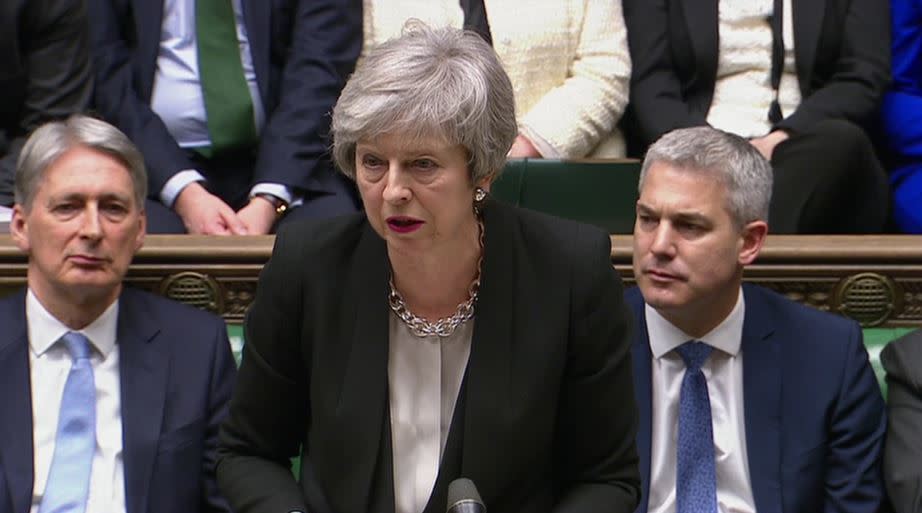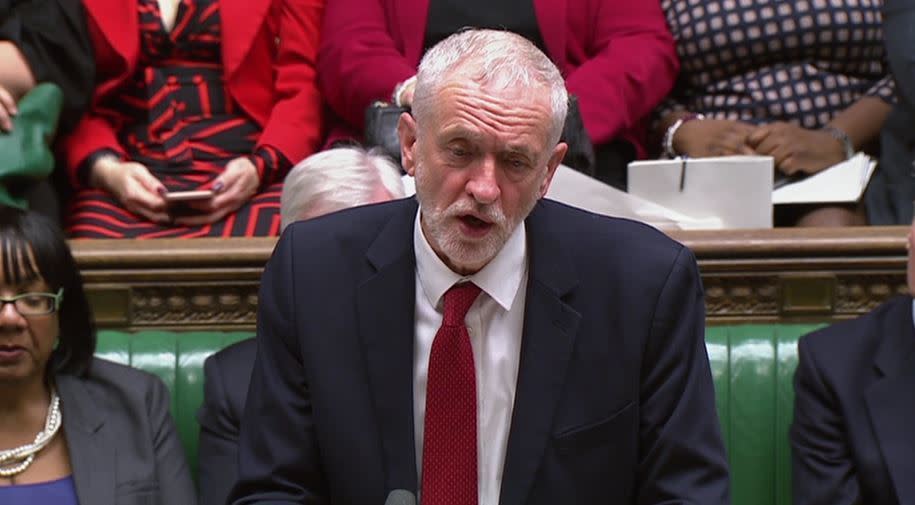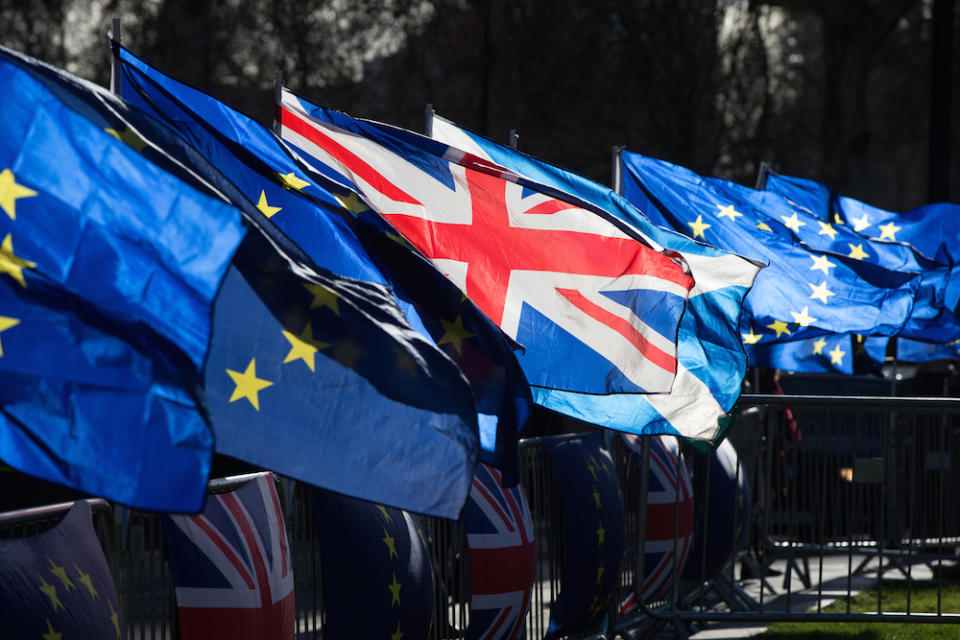Brexit latest: Theresa May wins MPs' backing to renegotiate Brexit deal... but EU slaps her down immediately
Hard-line Tory Brexiteers wrestled control of Theresa May’s plan to leave the EU as the PM won support from a majority of MPs to return to Brussels and renegotiate her deal.
On a remarkable night in the House of Commons, of the eight votes that could potentially redefine the course of Brexit, seven of them were favourable towards Mrs May.
In supporting the so-called ‘Brady amendment’ by a slim majority of 317-301, MPs have given Mrs May a mandate to try to renegotiate the Brexit deal with the EU in which she will seek to replace the controversial Irish backstop with an as-yet unspecified alternative.
Crucially, MPs also rejected a vote that would have forced Mrs May to delay Brexit to avoid crashing out with no deal. However, they also supported a separate vote that stated the House of Commons rejected the no-deal option.
The main difference between the two votes is that the latter is not legally binding and therefore doesn’t box Mrs May into a corner.
Critically, the Brady Amendment has received backing from hard-line Brexiteers, who are staunchly opposed to the Irish backstop, which they say could tie the UK to the EU indefinitely.
Mrs May will now go back to Brussels to come up with ‘alternative arrangements’ to the backstop. The backstop is in place to stop the return of border checks.
Reaction from the EU was swift, however. Within 10 minutes of the vote, a spokesperson for Donald Tusk said: “The backstop is part of the Withdrawal Agreement, and the Withdrawal Agreement is not open for re-negotiation.”

The response
Speaking after the vote during a pivotal evening, Mrs May told MPs: “It’s now clear there is a route that can secure a substantial and sustainable majority in this House for leaving the EU with a deal.
“We will now take this mandate forward and seek to obtain legally binding changes to the Withdrawal Agreement that deal with concerns on the backstop while guaranteeing no return to a hard border between Northern Ireland and Ireland.”
Labour leader Jeremy Corbyn said he would be willing to enter into Brexit talks with Mrs May.
He said: “Now that the House has voted emphatically to reject the no deal option the Prime Minister was supporting could I say we are now prepared to meet her to put forward the points of view from the Labour Party of the kind of deal we want from the European Union.
“To protect jobs, to protect livings standards, and to protect rights and conditions in this country.”

DUP Westminster leader Nigel Dodds told the Commons: “This is a significant night because for the first time the House by majority has expressed what sort of deal will get through and will have a majority, and we will work with the Prime Minister to deliver the right deal for the United Kingdom.”
But the SNP’s Westminster leader Ian Blackford claimed that by passing the so-called Brady amendment the Government had “ripped up the Good Friday Agreement”.
To jeers from Tory MPs he said: “We were told the backstop was there to protect the peace process but tonight the Conservative Party has effectively ripped apart the Good Friday Agreement. This House should be ashamed of itself.”
He said Scotland had been “silenced, sidelined and shafted by the Tories”.
An angry Chuka Ummuna hit out at hardline Brexiteers after an amendment tabled by Yvette Cooper to extend Article 50 beyond March 29 was defeated.
He said it showed Theresa May was being ‘held hostage’ by a hardline faction of Brexiteers within her own party and the votes showed Tories were more concerned with keeping their own party unified than serving the best interests of the country.

What is the Brady Amendment?
Tory MP Sir Graham Brady’s amendment proposed replacing the controversial Northern Ireland backstop with “alternative arrangements to avoid a hard border”.
Ahead of the vote, Sir Graham said he hoped House of Commons backing would give Mrs May “enormous firepower” when she returns to Brussels to seek concessions on her Brexit deal.
It is supported by right-wing Tories and the DUP, which is crucial to the PM ultimately getting a deal from the House of Commons.

Non, nein, niet
In Brussels, the EU remains resolute that the Withdrawal Agreement would not be reopened.
In a statement following the dramatic night in Westminster, a spokesman for European Council President Donald Tusk said: “The Withdrawal Agreement is and remains the best and only way to ensure an orderly withdrawal of the UK from the European Union.
“The backstop is part of the Withdrawal Agreement, and the Withdrawal Agreement is not open for re-negotiation.”
His view was echoed by French President Emmanuel who described the Withdrawal Agreement as “not renegotiable”.
Speaking in Cyprus moments before MPs voted, the French President Emmanuel Macron said: “As the European Council in December clearly indicated, the Withdrawal Agreement negotiated between the UK and EU is the best agreement possible. It is not renegotiable.”
Earlier on Tuesday, the European Parliament’s Brexit coordinator Guy Verhofstadt told the Independent: “The deal we have is fair and cannot be re-negotiated. The backstop is needed because of UK red–lines and was crafted by the UK and the EU to secure the Good Friday Agreement.”
European Commission vice-president Jyrki Kateinen said there was “no reason to give any concessions” to the UK and there was “not much room for manoeuvre” on the backstop.
It would be “stupid” for the EU to make concessions putting the remaining 27 members at a disadvantage simply to secure a deal, he said.

No-deal or no no-deal?
As part of the series of votes on amendments, MPs approved a cross-party amendment to reject a no-deal Brexit.
The amendment, tabled by Midlands MPs Caroline Spelman and Jack Dromey, is not legally binding on the Government but puts huge pressure on Mrs May to delay Brexit from its scheduled date of March 29 if she cannot secure a new deal from Brussels.
Speaking after the vote, Mrs May told MPs: “I agree that we should not leave without a deal. However, simply opposing no-deal is not enough to stop it.
“The Government will now redouble its efforts to get a deal that this House can support.”
She admitted that negotiating would “not be easy” but Mrs May said she would seek “legally binding changes to the Withdrawal Agreement that deal with concerns on the backstop while guaranteeing no return to a hard border”.
She told MPs: “If this House can come together, we can deliver the decision the British people took in June 2016, restore faith in our democracy and get on with building a country that works for everyone.
“As Prime Minister I will work with members across the House to do just that.”
What happens next?
Theresa May has a fortnight to sort out this mess.
She has promised MPs will get another chance to vote on the new deal – if it is a new deal – in a couple of weeks’ time.
The next meaningful vote is expected to take place on February 14.
If that fails, the PM will need to decide on whether the UK will pursue a no-deal Brexit.
If she succeeds, she may still need to delay Brexit to allow Parliament time to get the deal through the House of Commons.

 Yahoo News
Yahoo News 
